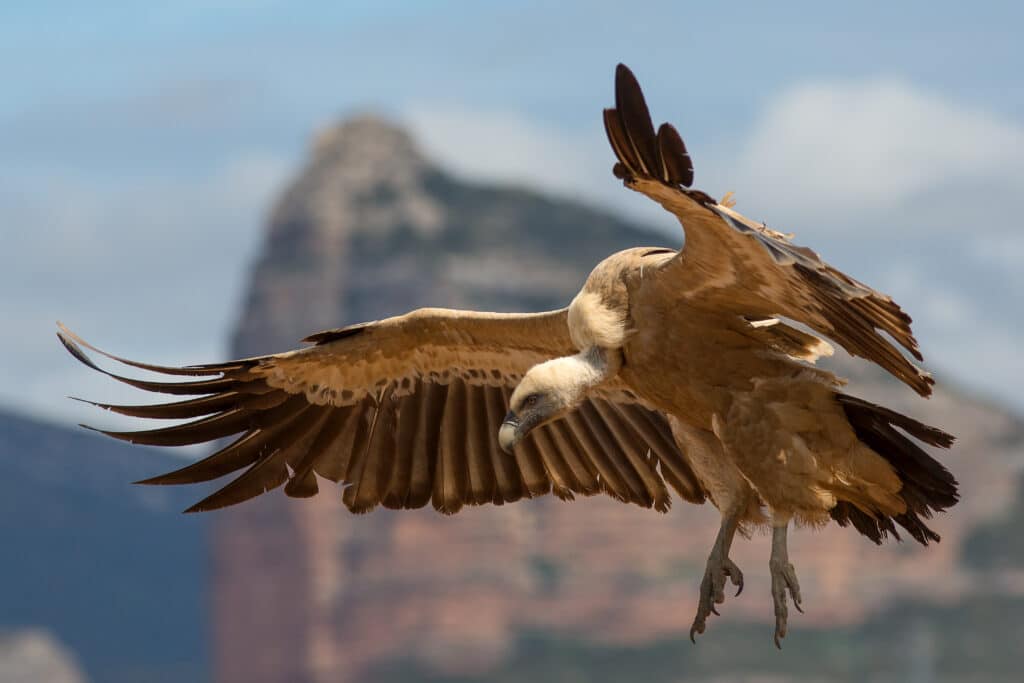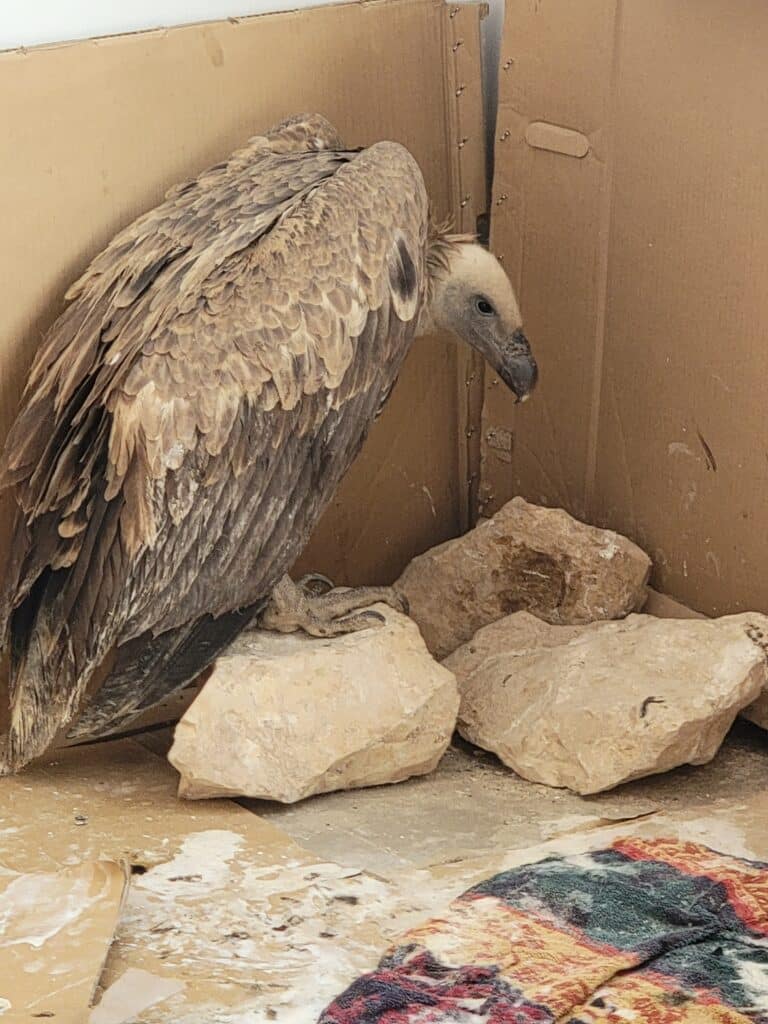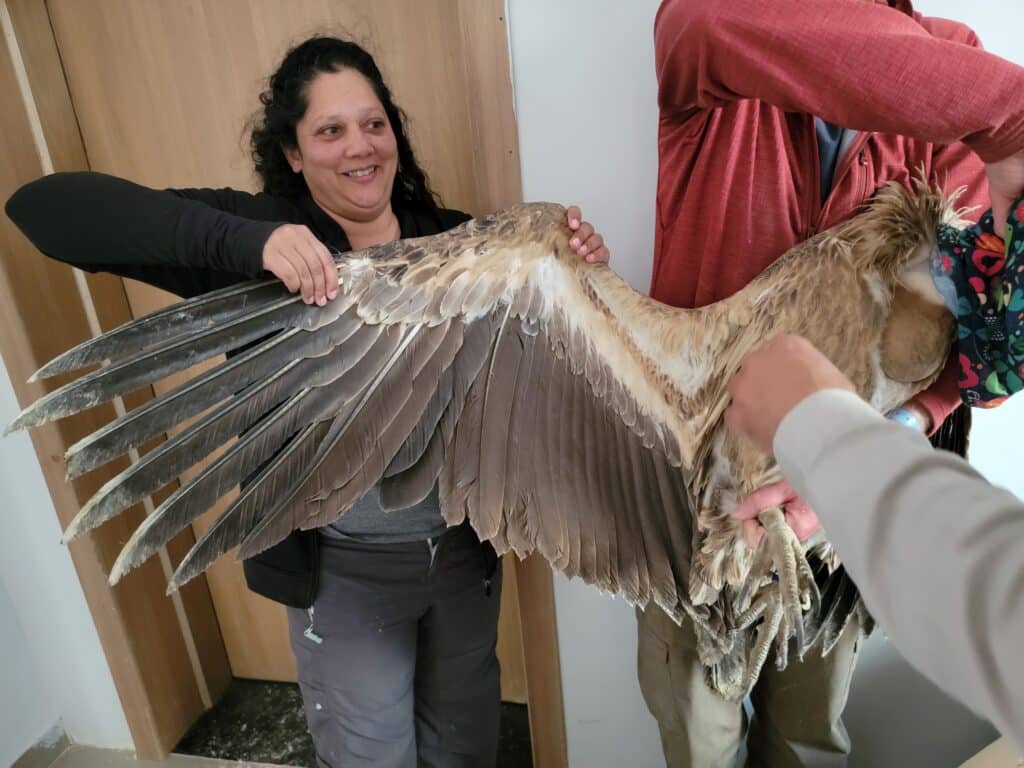How we are saving Africa’s vultures
Know more about our vulture conservation strategy on the continent in this video
As a global Partnership, we believe in internationalism. We have translated as much content in your language as our resources allow. Please visit the English language site to view all of our content.

By Nature Conservation Egypt
Cover photo: Griffon vulture © Pierre Dalous
The wind gusted around Khaled El Noby, as he peered through his binoculars watching the awe-inspiring spectacle of the spring migration from his vantage point on the hills of Galala in Northeastern Egypt. Suddenly, his phone pinged – a strange sensation in this barren landscape where the signal was erratic at best. His WhatsApp messages were abuzz with news from a windfarm where members of Nature Conservation Egypt (NCE, BirdLife partner) – the conservation organization that he heads, had spotted a grounded Griffon vulture (Gyps fulvus). The vulture appeared to be struggling to move and they did not know what to do. Further worsening the situation was the ferocity of the wind, which made it impossible for the vulture to even sit on the ground.
Khaled immediately sprang into action, chatting to his colleagues at the Galala Raptor Count, a NCE led initiative under the umbrella of Galala Bird Observatory which aims at establishing a permanent station to monitor and study migratory birds, as well as reaching out to the larger group on the WhatsApp chat for advice. The experts’ opinions were divided, it could either be a potential poisoning victim or a completely exhausted, dehydrated vulture. Either way, the course of action was clear – the Griffon vulture needed to be rescued.
Consequently, Salisha Chandra, the Africa Vulture Conservation Coordinator at BirdLife International, quickly reached out to her network of raptor rescue experts and formed a group to support Khaled and the team with the rescue and subsequent rehab process. Khaled and Jenny Weston, Conservation Officer at the Royal Society for the Protection of Birds (RSPB), set off on a three-hour drive to pick up the vulture and bring it back to the Galala University.
The University’s Faculty of Science agreed to house the bird and look after it. Once the bird arrived, it was ascertained that severely starvation and dehydration – possibly due to the higher temperatures and lack of food along his migratory pathway.
“Galala University is considered one of the smart universities that has recently been established in the new city of Galala on the Galala plateau in the Red Sea coast, south of Suez. The university is uniquely located, near the Galala Observatory. When the university got a call from the Galala Observatory team that a vulture was injured, and required medical attention, the university’s Biological Sciences team in the Faculty of Science and the university’s top management were at hand to provide support”, said Professor Magdi El-Sayed, Coordinator of Biological Sciences Department at Galala University.
The first few days are critical in any rehabilitation process. The Griffon needed to be fed a diet of pureed liver/meat and rehydration salts – initially through a feeding tube and subcutaneous injections. It was touch and go but Nisr (meaning vulture in Arabic) – fondly named by those looking after him pulled through thanks to the efforts of NCE, RPSB and the Galala University team.
“As soon as the bird arrived, it received first aid and treatment with the help of the biology and the observatory teams in the Faculty of Science before rehabilitating it to return to flight. Many of these cases faced death in the past because of the region’s remoteness, but with the presence of Galala University, the situation has changed. The University and NCE are collaborating towards the establishment of bird enclosure to provide full treatment and rehabilitation service for birds in future”, added Professor Magdi.
Over the month that Nisr stayed with NCE, all the vulture’s caretakers developed a strong attachment to it. They often joked that Nisr was the best fed creature in Egypt, feasting on lamb, camel meat and other delicacies. They were happy when the vulture regained strength and weight and started to flap about and express itself. Listening to advice from raptor rehab experts from South Africa and Kenya, NCE’s chairman, Sherif Baha El Din, made a special enclosure for Nisr in his garden – with perches and a water hole to boot. But more than anything, they wanted Nisr to fly off into the distance to its breeding grounds.
After one month of rehabilitation, Nisr was released in May to join his feathered brethren on the flyway to Eastern Europe. Haitham Ibrahim, Head of Conservation, at NCE watched him take flight after almost two hours of sitting and watching other raptors including five Egyptian Vultures fly by and sent out a silent prayer for his safe journey.
“It truly is amazing what one bird can teach us, and what one animal can mean for conservation efforts. Nisr possibly heralds a new dawn for vulture conservation in Egypt, providing clues as to what’s needed to help these beautiful and magnificent birds survive and building local capacity to fulfil those needs all while making a place in the hearts of all those they came into contact with. There is a feeling that both hotter temperatures due to climate change and lack of food availability due to changing practices have made this migration difficult. NCE is now looking into conservation interventions that may help reduce these obstacles and enable a safer migration”, noted Salisha.
BirdLife International and NCE are committed to making a difference for all raptors that make this journey. The Galala Raptor Count and the successful rehabilitation of Nisr, are but the first steps on this pathway.
“Nature conservation is a very challenging work to do and can be very frustrating. But it is incredible how much positive energy we get by being too close to birds either by monitoring them on top of Galala hills or by rescuing one of their magnificent individuals. Helping Nisr recover, together with RSPB colleagues and Galala University staff, was actually a process of helping ourselves to feel better and be free of all conservation frustration” concluded Khaled.


How we are saving Africa’s vultures
Know more about our vulture conservation strategy on the continent in this video